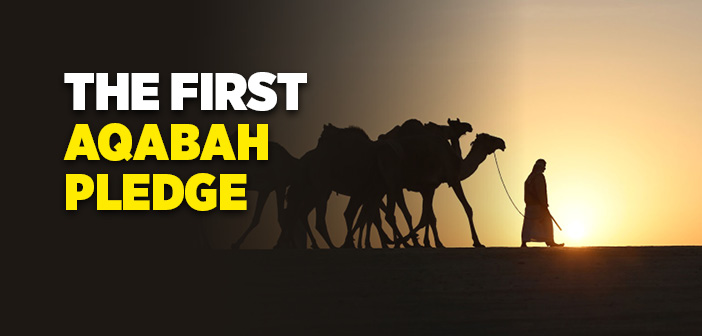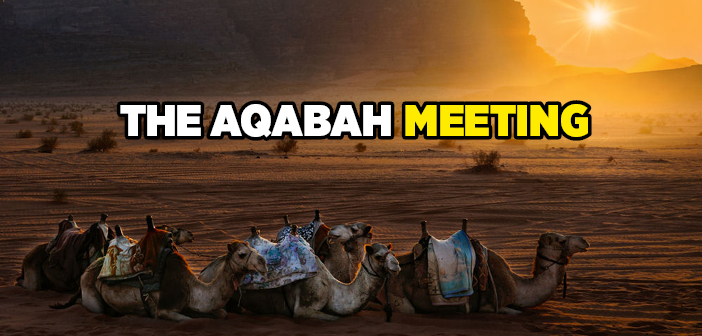The second aqabah pledge (the thirteenth year of prophethood)
A year after the First Aqabah Pledge, during the months of pilgrimage, a group of Medinans came again to meet the Noble Prophet -upon him blessings and peace-, this time numbering seventy-five, including two women.
Their pledge of allegiance to the Messenger of Allah -upon him blessings and peace- is known as the Second Aqabah Pledge.
Arriving at Mecca as the head of the group, Musab –Allah be well-pleased with him- went straight to the Prophet -upon him blessings and peace- before his own home. He gave the good news of the Ansar’s swift acceptance of Islam, delighting the Noble Prophet -upon him blessings and peace-. But the fact that Musab went to the Prophet -upon him blessings and peace- before seeing his own pagan mother made her quite upset.
“I will never go to anyone before the Messenger of Allah…I shall never put anyone else before him”, was how Musab defended himself.
With permission from the Blessed Prophet -upon him blessings and peace-, Musab –Allah be well-pleased with him- eventually went to his mother and repeated his invitation to Islam. (Ibn Saad, III, 119)
Such was the love nurtured by the Companions for the Gracious Prophet -upon him blessings and peace-.
Jabir –Allah be well-pleased with him- explains the following:
“In the days when the Messenger of Allah was searching for a tribe for protection for his fellow Muslims, only to have each and every one of them turn a cold shoulder, the Almighty sent us to him from Medina; and we believed in him and offered protection. Someone from among us would go to the Messenger of Allah, who would read him the Quran. Upon returning, the person’s whole family would follow the lead and become Muslim. In this way, there was no house in Medina in which Islam had not been explained. Then after a while, we got together and asked ourselves:
‘Until when are we going to let the Messenger of Allah -upon him blessings and peace- suffer in the mountains of Mecca?’
That was when we decided to go to him, during the pilgrimage season, and pledge our allegiance.” (Ahmad, III, 322; Hakim, II, 681-682)
This fortunate group agreed to meet the Prophet -upon him blessings and peace- at Aqabah on one of the days of tashriq. Beforehand, the Messenger of Allah -upon him blessings and peace- advised them not to “…awaken those asleep and wait for those who have not gotten ready on time!”
Passed the third of the night, the Medinans went to Aqabah as agreed and began waiting for the Noble Messenger -upon him blessings and peace-, who appeared a short while later with his uncle Abbas by his side. Even though Abbas had not yet accepted Islam, he had nonetheless assumed the protection of his nephew after the passing away of Abu Talib. And it was he who began negotiating with the Medinans regarding their invitation of the Prophet -upon him blessings and peace- to Medina:
“Medinans! We have protected him from his enemies till now and will continue to do so. He is highly respected among us. And it is out of love and respect that you invite him to Medina where he will be safer; and that happens to be his wish, too. But take him only if you will be able to protect him from his enemies. First you must promise me that you shall never deceive or desert him. Your neighbors, the Jews are hostile to him and I am just not so sure that they will keep their word of peace. Go ahead with this only if you see in yourselves enough power to ward off the hostility of Arab tribes. Discuss it among yourselves thoroughly so that you will not become disunited later. If you have the least doubt of not being able to help Muhammad after he comes, or if it turns out you will hand him over to his enemies, then give the idea up from now! If anyone wishes to speak up from among you now, then let him speak. But let him not be too wordy, as Meccans spies could be on the lookout! And keep this a secret after you leave!”
To dispel the doubts of Abbas, Asad ibn Zurarah –Allah be well-pleased with him- stood and said the following:
“You, the Messenger of Allah, invited us to leave the religion of our fathers and follow yours. As burdensome and difficult a task as that was, we accepted. You invited us to severe our ties with all our pagan relatives and neighbors. As burdensome and difficult a task as that was, we again accepted. We are well aware that we have put our hands up to shelter one who is wanted dead not only by his tribe, but even by his closest kin. Rest assured, Messenger of Allah, that we shall protect you just like we protect ourselves, our children and women. If we turn back, then we are the most wretched of all creatures. This is our pledge of honor. It is to Allah we all turn for help!”
Following Asad –Allah be well-pleased with him-, Abdullah ibn Rawaha –Allah be well-pleased with him- got up to say:
“Messenger of Allah! You can lay down for us any condition you want, on behalf of yourself and your Lord!”
“On behalf of my Lord, I ask you to worship Him without ascribing to Him any partners; and on behalf of myself, I ask you to protect us just as you protect yourselves and properties”, the Noble Prophet -upon him blessings and peace- said.
“And what awaits us if we do?” the Medinans asked.
“Paradise”, the Prophet -upon him blessings and peace- answered.
“What a profitable trade! Who in their right minds could afford to pass up on that?” (Ibn Kathir,Tafsir, II, 406)
Abdullah ibn Rawaha –Allah be well-pleased with him- was to reap the profits of this pact years later at the Battle of Mutah, in which he enthusiastically took part despite being informed by the Prophet -upon him blessings and peace- beforehand that he would be martyred; and presenting his life to the Almighty and his legacy to the treasury of Medina, he ended up taking flight to Paradise, to his Lord. The other companions also added more and more blessings to their spiritual earnings by persevering constantly in the way of the Almighty.
The following ayah of the Quran was revealed in relation to the pledge of the Medinans.
“Surely Allah has bought of the believers their persons and their property for this, that they shall have the Garden; they fight in Allah’s way, so they slay and are slain; a promise which is binding on Him in the Torah and the Gospel and the Quran; and who is more faithful to his covenant than Allah? Rejoice therefore in the pledge which you have made; and that is the mighty achievement.” (at-Tawbah, 111)
Thereafter, a few more were given opportunity to speak. Afterward, the Prophet -upon him blessings and peace- began his address of the Medinans, quoting the Quran to further elaborate Islam, then making explicit the terms of their pledge. In addition to the terms already agreed upon, the following terms were also added:
- The leader of the Muslims should not be opposed, whoever he may be.
- No blame that may come from the way of nonbelievers should be feared in persevering in the cause of Allah, glory unto Him.
- To obey the Messenger of Allah -upon him blessings and peace- through thick and thin and to prefer him to themselves; not to disobey him in any way.
The Noble Messenger -upon him blessings and peace- then asked for twelve naqibs[1], or delegates, to represent their clans. The Medinans nominated twelve people, nine from Khazraj and three from Aws.
“You are bondsmen for your clans, just as the Apostles were bondsmen for Isa, the son of Maryam. And I am a bondsman for the Muslims of Mecca”, the Light of Being -upon him blessings and peace- said to them.
The representatives agreed.
Abbas, the Prophet’s -upon him blessings and peace- uncle, then one by one made each Medinan clasp the hand of the Prophet -upon him blessings and peace- and swear an oath of allegiance.
It was in this pledge that the Messenger of Allah -upon him blessings and peace- was invited to Medina, which sparked the Hegira. Medina, known as Yathrib at the time, had now become ready to open her arms to Islam.
As the pledge took place at night, the Meccans had no way of knowing about it. But just as the pledge was being concluded, Iblis, overlooking Aqabah, screamed in a shrill voice:
“People of Mina! Quraysh! Do you realize that Muhammad and those who have turned their backs on the religion of old have gathered and agreed on waging war against you?”
The Prophet -upon him blessings and peace- was quick to reassure them:
“Don’t fear! That is the voice of Iblis, the enemy of Allah. He can do nothing!” He then advised the Muslims to return to their camps, upon which Abbas ibn Ubadah –Allah be well-pleased with him- assured:
“I promise by the One who has sent you with the Truth, we could put all of Mina to the sword if you want!”
“We have not been commanded to do that. Now, you should return to your places”, the Noble Prophet -upon him blessings and peace- responded.
The Muslims returned to their camps, sleeping until daybreak. Early in the morning, some Meccan idolaters arrived at the camp that included the Muslims, asking the nonbelievers among them whether any agreement with the Noble Prophet -upon him blessings and peace- had taken place. Without the least clue as to what had happened, they assured the Meccans that nothing of the sort had taken place. Unconvinced, the idolaters further investigated the Aqabah Pledge. Soon their worst fears were confirmed as they found out about the Pledge, immediately after which they sent horsemen in all directions to track down the departing Medinans, blocking all routes to Medina. They were able to pin down Saad ibn Ubadah –Allah be well-pleased with him-.
“Have you entered Muhammad’s religion?” they inquired.
When Saad –Allah be well-pleased with him- answered that he had, they tied both his hands tightly around his neck. Beating him and pulling him by the fringes of his long hair, they brought him to Mecca, where they began to torture him even more brutally. He was set free by Jubayr ibn Mutim,[2] whom Saad –Allah be well-pleased with him- had helped before, and Harith ibn Harb, who rushed to the scene upon hearing of the incident. Just when the Medinan Muslims had gathered to plan his rescue, Saad –Allah be well-pleased with him- was able to turn up next to them. (Ibn Hisham, II, 47-57; Ibn Saad, I, 221-223; III, 602-603; Ahmed, III, 322, 461, 462; Haythami, VI, 42-44)
Ibn Abbas –Allah be well-pleased with him- has said:
“Just as the Messenger of Allah -upon him blessings and peace-, Abu Bakr and Omar -Allah be well-pleased with them- are among the Muhajir, the Emigrants, for leaving the idolaters of Mecca, there are also emigrants from among the Ansar, the Helpers of Medina; those, who on the night of Aqabah, fled to the Messenger of Allah -upon him blessings and peace- from the then pagan town of Yathrib.” (Nasai, Bayat, 13)
The Pledges of Aqabah do not simply signify a pledge made by twelve or seventy-five people, but the pledge of the entire Muslim host with the Almighty.
The world is a bazaar in which the Hereafter is bought. It remains for us to participate in the above pledge made with the Noble Prophet -upon him blessings and peace- and, like the Companions, rejoice over such a profitable trade.
Just as Musab –Allah be well-pleased with him- provided a foundation for Islam in Medina, so should we establish the very same foundation in our hearts and those of others, even going door to door in extending that foundation through exemplary behavior. Once the heart is filled with the love of Allah and His Messenger, sacrificing the pleasures of the world, like Musab –Allah be well-pleased with him-, becomes easy.
[1] A naqib is a representative of a tribe or a clan.
[2] Jubayr ibn Mutim –Allah be well-pleased with him- was a relative of the Blessed Prophet -upon him blessings and peace-. For a long time he resisted Islam; he was even in the group that decided on the assassination of the Noble Messenger -upon him blessings and peace-. He sided with the idolaters in the Battle of Badr. At Uhud, he allowed for Wahshi, then his slave, to play a central role in the martyring of Hamza –Allah be well-pleased with him-. Immediately after the Peace of Hudaybiyah, however, he entered Islam, becoming a sincere Muslim thereafter. A perceptive man of a mild temperament, Jubayr narrated 60 hadiths till his passing away in Medina in 678. (H. 58)
Source: Osman Nuri Topbaş, The Prophet Muhammed Mustafa the Elect, Erkam Publications
SIMILAR ARTICLES
- WHAT IS ISLAM?
- THE FAMILY TREE OF PROPHET MUHAMMAD SAW
- THE FIRST AQABAH PLEDGE
- FREE ISLAMIC BOOKS READ AND DOWNLOAD PDF
- THE AQABAH MEETING





